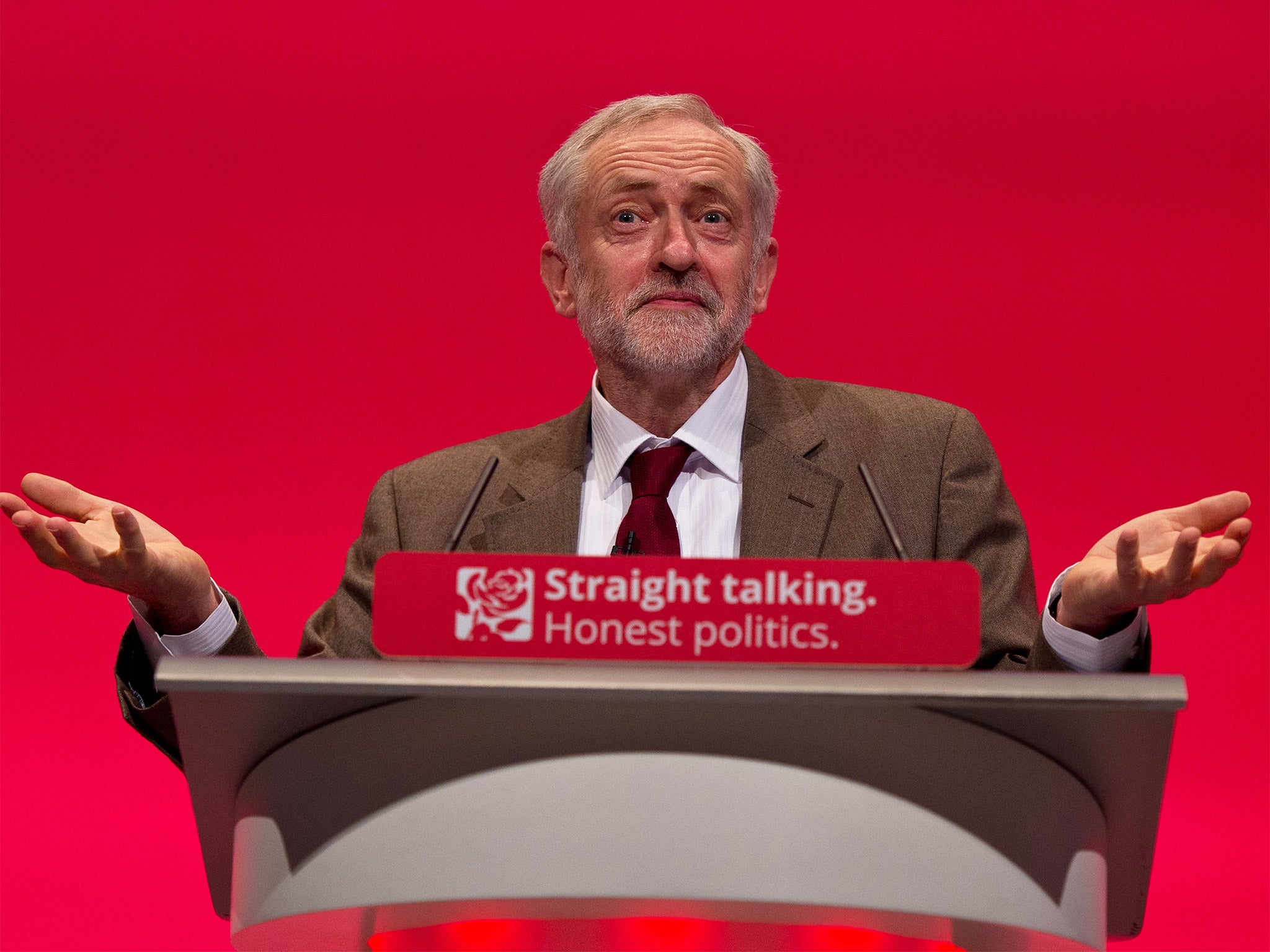Jeremy Corbyn missed his chance to cast a spell over the party faithful
While Mr Corbyn spent the summer electrifying public meetings, the new Labour leader remains a poor speech-maker


Your support helps us to tell the story
From reproductive rights to climate change to Big Tech, The Independent is on the ground when the story is developing. Whether it's investigating the financials of Elon Musk's pro-Trump PAC or producing our latest documentary, 'The A Word', which shines a light on the American women fighting for reproductive rights, we know how important it is to parse out the facts from the messaging.
At such a critical moment in US history, we need reporters on the ground. Your donation allows us to keep sending journalists to speak to both sides of the story.
The Independent is trusted by Americans across the entire political spectrum. And unlike many other quality news outlets, we choose not to lock Americans out of our reporting and analysis with paywalls. We believe quality journalism should be available to everyone, paid for by those who can afford it.
Your support makes all the difference.Throughout the long summer, Jeremy Corbyn electrified public meetings around the country. Yet he is not an especially good speech-maker. The gap between ecstatic reaction and the quality of oratory was one of the many strange twists in Labour’s leadership contest.
In his first conference speech as party leader, Corbyn continued to be a poor speech-maker.
The leader’s speech is a demanding art form. He or she must cast a spell over the conference hall and the wider electorate who might pay fleeting attention. This requires carefully framed arguments, proposals that make sense of the arguments, a clear beginning, middle and end.
Instead, Corbyn went from one topic to another, sometimes returning to a theme he seemed to have already addressed.
Labour has not had a leader since Tony Blair who could frame arguments in a way that compels and appears to make sense. Blair is out of fashion to put it mildly, but the skill to make compelling speeches is part of the impossibly demanding leader’s repertoire.
Although meandering, there were some highly significant elements. Corbyn was surprisingly defiant about his determination to prevail in the highly charged internal debate over Trident, arguing he had a mandate to oppose renewal. How he prevails and what happens, when senior Shadow Cabinet members support Trident, is one of several policy hurdles looming awkwardly.
Evidently Corbyn plans to give far more policy-making powers to the membership that elected him. But he still has to “persuade” his MPs on this and other issues, as he put it optimistically in a recent interview.
As far as I can tell, he will not persuade his shadow Defence Secretary, Maria Eagle, who made clear when she took the post that she was a supporter of Trident.
Still, Corbyn has the right personality to navigate some of the way through these stormy waters. Although not an orator he has a reassuring platform presence. Voters who might have read that Labour had elected a revolutionary tyrant will see in TV news clips a reasonable sounding, good-humoured moral preacher on the conference stage, a less mesmeric version of his late friend and hero, Tony Benn.
Indeed, Corbyn’s speech was partly Bennite, enthusing about the party making decisions rather than MPs, highlighting the centrality of nuclear disarmament to his wider political beliefs while highlighting injustices around the globe and attacking the Conservatives cleverly by turning their language of “economic security” against them.
Benn always said that if he had won the leadership he would have had to compromise. Corbyn is discovering fast that compromise is unavoidable, but the speech was assertive while hailing his willingness to debate.
It was more the speech of a leader with the confidence of a big mandate than one who feels the need to concede too much ground, at least during this early stage.
As one example, he opened his speech by attacking the media and returned to this subject several times, when some of his advisers consider the onslaught to be unwise or pointless.
The doubting advisers are right. I understand why Corbyn feels strongly on the topic, but one of the few iron laws of politics is that while the media is allowed to attack elected politicians, elected politicians are not allowed to attack the media.
Alienating the media even more will not help Corbyn get his message across, even in an era where social media allows a degree of more direct access to voters.
But Corbyn is the politician who breaks political laws, the rebel backbencher who now leads his party, a rise that made the only sporadically interesting address an intoxicating event on grounds of mind-boggling novelty alone.
He is the leader who calls for a new type of “kinder” politics and yet his election has already triggered a mutinous response, with a lot of senior Labour MPs and all former leaders absent from his speech. He is the leader who has captivated a hundred halls this summer, the politician as rock star, yet he is not a natural orator. He is a modest and self-effacing public figure while becoming the most talked about politician for many years.
The speech was a chance to make sense of it all, or appear to do so given that speech-making is a form of artistry. He did not take the chance.
Join our commenting forum
Join thought-provoking conversations, follow other Independent readers and see their replies
Comments